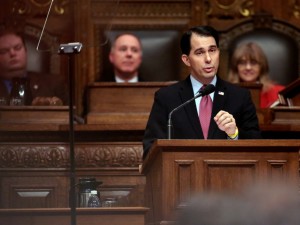Right to work for less
< < Go Back
By Jared Bernstein,
The art of the misnomer — an industry standard of American politics — has rarely been more effectively applied than in right-to-work laws. Since Wisconsin Gov. Scott Walker (R) and the state legislature are in the midst of trying to turn the state into the 25th covered by the laws, it’s worth unpacking what’s going on here.
Here’s what the legislation does: It makes it illegal for unions to negotiate contracts wherein everyone covered by that contract has to contribute to its negotiation and enforcement.
Let’s be very clear about this: RTW does not confer some new right or privilege on those in states that adopt it. It takes away an existing right: the ability of unions to require the beneficiaries of union contracts to pay for their negotiation and enforcement. In anything, the law creates a right to freeload — to reap the significant benefits of union bargaining without paying for them.
Let’s also be clear about what goes on in non-RTW states, as anti-union forces consistently distort the current reality. In non-RTW states, no one has to join a union. There have been no “closed shops” in America for more than 20 years. When RTW advocates say they’re fighting against “forced unionism,” they are making stuff up. There’s no such thing.
Workers in a bargaining unit in non-RTW states don’t even have to pay full union dues. If they object to, say, the union’s political activities, they can pay reduced dues that cover only the costs of negotiating and enforcing the contract. Since that’s most of what local unions do, by the way, such fees amount to 80 percent to 90 percent of full dues.
So when Steve Moore of the Heritage Foundation claims that workers in non-RTW states “can be compelled to join a union and pay dues at a union shop whether they wish to or not” or that they “can even be forced to pay union dues for partisan political activities with which they don’t agree,” he’s deep within a fact-free zone.
Gordon Lafer, whose work on this issue is indispensable, points out the following:
“There are many organizations that, like unions, require membership dues. For instance, an attorney who wants to appear in court must be a dues-paying member of the bar association. One may dislike the bar association, but must still pay dues if he or she wants to appear in court. Condominium or homeowners associations similarly require dues of their members. A homebuyer can’t choose to live in a condominium development without paying the association fees. Yet the national corporate lobbies supporting RTW are not proposing a ‘right to practice law’ or a ‘right to live where you want.’ They are focused solely on restricting employees’ organizations.”
Brad Plumer reviewed the exhaustive research on the effect of RTW on state economies and provides this useful summary:
“There’s a dizzying amount of research on the subject, but a few broad conclusions have emerged over the years: Right-to-work laws do weaken labor unions. The laws appear to tilt the balance of power so that workers reap fewer of the gains from growth. And it’s still hard to find definitive evidence that right-to-work laws help (or harm) a state’s overall economy.”
Finally, economists Heidi Shierholz and Elise Gould do the rigorous statistical analysis to quantify Plumer’s “appear to tilt” point. They look at the difference in pay between RTW and non-RTW states and find that the “raw” difference, with no effort to control for the wide variety of wage determinants, is about 14 percent in favor of non-RTW states.
More From The Washington Post:




